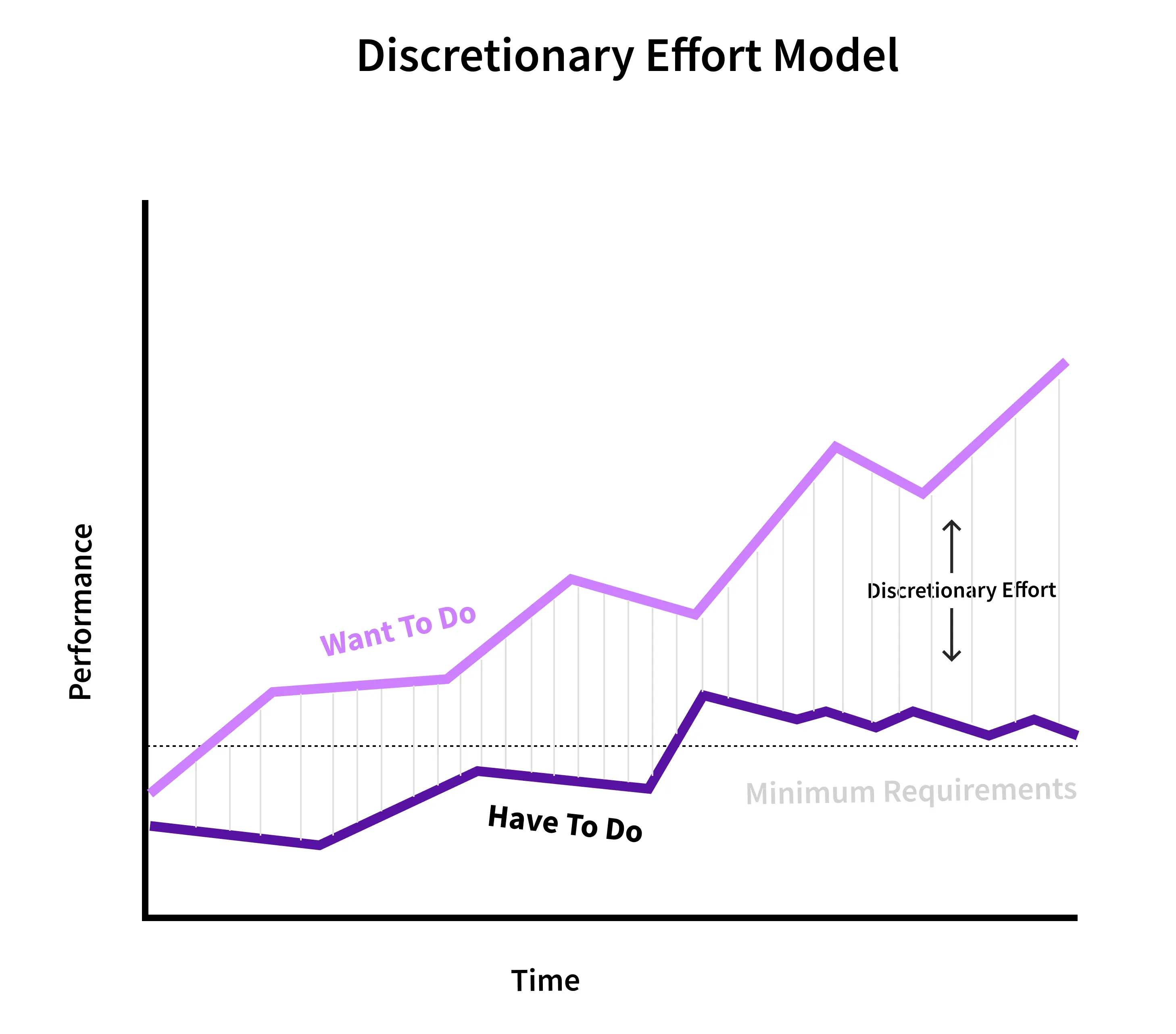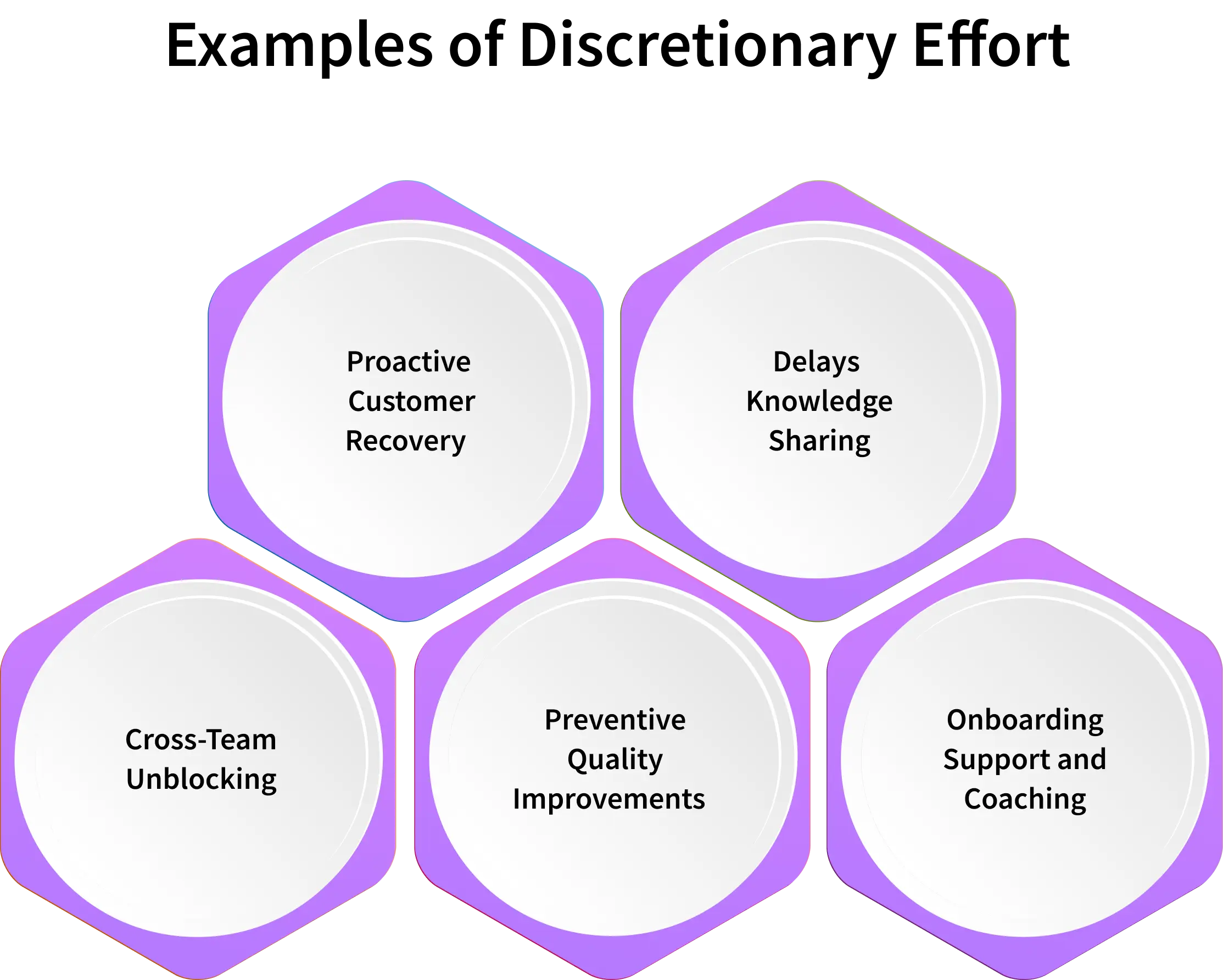Home / D / Discretionary Effort
Discretionary effort is voluntary effort in which the employee goes beyond the minimum effort. It is manifested in activeness, quicker response, and better-quality decisions, especially when no one is looking. Organisations that tap into this reserve outperform their counterparts with the same number of employees and equipment.
The impact of discretionary effort is seen across teams. When employees step up and share knowledge, solve challenges early, and prevent errors, trust grows, and costs fall. It’s not about working longer hours, but about smarter collaboration, sharper decisions, and taking ownership to achieve results faster.
What is Discretionary Effort?
Discretionary effort is the voluntary performance employees provide above and beyond what is expected of them to complete their job. It involves initiative, persistence, quality improvements, customer care, and collaboration that are not required but are provided because employees are motivated, empowered, and aligned to organisational objectives.
The core purpose of discretionary effort is to inspire employees to give more when their work feels meaningful, their environment is fair, and leadership removes unnecessary friction. Employees are more willing to go beyond expectations when they see purpose in their tasks, when they are trusted with autonomy and resources, and when recognition builds confidence. In this model, motivation comes from purpose and acknowledgement, enablement comes from tools and independence, and trust comes from fairness and psychological safety. Strengthening these elements raises the overall level of discretionary effort within the organisation.
Discretionary effort and employee engagement are closely related but different. Engagement refers to willingness and emotional commitment, while discretionary efforts refer to the observable efforts that result from faster handoffs, clearer documentation, and preventing problems before they arise. Engagement is the fuel, and discretionary effort is the movement that employees can feel.

Why is Discretionary Effort Important in the Workplace?
Discretionary effort determines the results leaders measure - growth, cost, speed, and risk. The following are some of the areas where its impact can be most clearly seen in terms of customers, quality, execution, and compliance.
1. Increases Retainership and Revenue
Extra care in responses, recovery after mistakes, and customised solutions make customers trust more. Positive surprises lead to word-of-mouth and repeat business. Where the competitors provide the minimum, discretionary effort distinguishes service and boosts conversion and retention rates.
2. Improves Quality and Reduces Rework Cycles
Employees who go beyond requirements pass through clearer tickets, try out edge cases, and close the loop with stakeholders. Defects decrease, handoffs go up, and rework decreases. The same capacity produces greater output in terms of value produced because first-time-right is the norm.
3. Advanced Execution Speed, Cycle Time
Reduce time to delivery and supporting decisions are made with options and prerequisites are planned in advance so that issues are unblocked earlier and better positioned to make a decision. Lead time decreases without increasing headcount, which helps to improve time to market and reactivity to customer demand.
4. Better Risk Management and Compliance
Discretionary effort is manifested in early escalation and ethical judgment. Employees raise anomalies, confirm assumptions, and write out decisions carefully without sacrificing speed, minimising audit findings and reputational risk.
5. Resilience During Change
When priorities are changed, learning and adoption are driven by above-baseline effort. Teams experiment, codify new practices, and support their peers, turning disruption into momentum. Transformation succeeds because individuals choose to make it successful.
What Are the Examples of Discretionary Effort?
Employees often show discretionary effort in small but impactful ways that go beyond their regular duties. The following examples highlight such efforts in clear and simple terms:

1. Proactive Customer Recovery
Service agent has a failure end-to-end- diagnoses root cause, manages teams, reports milestones, and makes follow-ups. The initiative goes beyond the usual scripts and turns a critic into a supporter, and avoids recurrent events through reported lessons.
2. Delays Knowledge Sharing
An analyst records a short walkthrough video when solving a complex task. This helps teammates learn faster, save time, and complete similar work more efficiently without repeating the same struggles.
3. Cross-Team Unblocking
An engineer provides quick input to help another team move forward, even though the task wasn’t originally theirs. This simple support reduces delays and keeps overall progress on track.
4. Preventive Quality Improvements
A finance associate will put validation checks in a spreadsheet and compose a mini-SOP on month-end. Mistakes are reduced, audit reviews are faster, and auditors complement the control. The improvements had not been commissioned.
5. Onboarding Support and Coaching
The new employees are allocated weekly office hours with a senior employee in the first month. The questions are answered in a short time, tribal knowledge is registered, and productivity increases earlier. It is voluntary, and its maintenance is justified by the fact that it clearly benefits the unit.
How to Encourage Discretionary Effort
Leaders are able to create situations where employees feel motivated and confident to give their best effort. The following practices will help to create clarity, autonomy, and psychological safety to make extra effort natural and sustainable.
1. Explain Intent and View of Sight
Share an effective mission and demonstrate how every role drives key metrics. As employees perceive the relationship between activities and results, voluntary extra effort will be meaningful as opposed to performative, which will maintain the energy over time.
2. Grant more Independence with Barricades
Proportional rights of decision-making on grants, as well as clear escalations. Autonomy helps to work faster; guardrails help to secure uniformity and risk. When made in good faith, employees will be more inclined to take initiative because their decisions will be supported.
3. Take Friction Away and Provide Tools
Repair sluggish approvals, inadequate ownership, or faulty systems. Offer current equipment, templates, and access to information. This reduces effort and removes barriers quickly, allowing discretionary effort to grow naturally.
4. Reward Certain Behaviours Publicly
Compliment specific actions such as incidents prevented, saved customers, or reusable assets, and tie them down to values and results. When done specifically, recognition educates the organisation on what above and beyond means and fosters the desire to repeat behaviours without spawning unhealthy hero culture.
5. Train Managers to Coach, Not Micromanage
Managers should receive guidance on how to coach effectively, ask the right questions, provide constructive feedback, and protect teams from distractions. When feedback is respectful and on time, the level of psychological safety increases. When the managers increase contributions, the employees volunteer more ideas instead of dictating every step.
What Are the Benefits of Discretionary Effort?
Discretionary effort generates measurable benefits for employees, teams, and the organisation. These advantages extend across productivity, growth, ownership, and financial performance, helping companies achieve higher returns without additional resources.
1. High Productivity with No Extra Staff
Organisations achieve more with the same resources when discretionary effort is present. Workflows run faster, errors are reduced, and decisions are made promptly. This efficiency eases budget pressure since teams use available funds more effectively and deliver greater value without needing new hires.
2. Better Employee Development and Contentment
When employees go beyond basic expectations, they participate actively in problem-solving, mentoring, and innovation. This accelerates personal learning, builds transferable skills, and creates opportunities for career advancement. At the same time, organisations benefit from employees who are more capable, engaged, and ready to take on leadership responsibilities.
3. Healthier Culture of Ownership
A culture of discretionary effort fosters accountability and cooperation. Employees take responsibility not only for their tasks but also for the collective outcomes. Challenges are approached as shared responsibilities, where colleagues support each other until issues are resolved, strengthening team bonds and organisational resilience.
4. Better Customer and Financial Results
With stronger ownership and higher productivity, organisations deliver faster, higher-quality service. This drives customer trust, repeat business, and referrals. Additionally, costs linked to errors, escalations, or lost opportunities are minimised. Over time, this leads to higher profitability, stronger retention rates, and a healthier bottom line.
5. Reduces Operational Risk
By contributing more actively, employees identify problems early and share them with leadership before they escalate. This proactive behaviour lowers operational risks, improves compliance, and increases organisational adaptability. As a result, the business becomes more resilient and can handle uncertainties with greater confidence.

